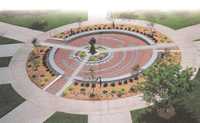
Merrell Bankston
is honored with a Brick from Lois Pitman.
1898-1978
Mother was one of the millions of heroines who neither sought nor received public notice. One of the cooks who would be called out as a group for applause after the church supper. Before I was ten I recall her wearing her good black dress to Eastern Star meeting, carrying her book of ritual when she was Worthy Matron. Later she was our 4-H leader when we girls were learning to bake muffins and angel food cake with eleven eggs. In the Home Demonstration Unit, she learned and shared homemaking skills. Nothing to make headlines.
Mother left school perhaps as early as the ninth grade to work as a telephone operator. She was mum about the exact year of her withdrawal, modest about any aspect of her life. At seventeen she married Thomas Muse Bankston, eight years her senior, a teacher and semi-pro ball player. She outlived him and two of their three children, all of whom went to college, no small feat in those days.
Her father, a Baptist minister, died when she was eight, and her mother, Grandma Fanny, opened a boarding house to support their four children. Mom became an excellent cook and always set an inviting table. We were proud to bring guests to meals, including my Father who, now a salesman, brought home colleagues on short notice sometimes.
She had a sense of beauty that enhanced everything she touched. Her daughters and granddaughters were delighted to wear her sewing creations and re-creations. It was a point of pride for me to accept compliments on dresses by crediting Mom right up until she was about eighty. She was responsible for virtually every item in my trousseau; and both my daughters considered no other wedding dress for their own.
When Dad's job faded during WWII we moved from a new house which he and Mom had planned to a small house of much older vintage. Mom hung criss-cross curtains at the windows, and with paper and paint gamely planted cabbage roses on the ceiling. She made a home with not a lot of money but a great dollop of tender, loving care. In a magazine she came across a picture of a child which she framed and hung. She told me that picture was her first conscious recognition of the beautiful in art. Many years later I was able to have it matted and reframed for her; it hangs on my wall now, a treasure. Her applique, embroidery, and needlepoint are prized possessions, typical of ordinary women of her era whose hands often fashioned their legacies.
It was her ability to continue learning that I admire so much. She already used good English, heritage of her parents, and she loved reading as a pastime. Her favorite book was Norman Vincent Peale's "The Power of Positive Thinking," but she enjoyed "Shepherd of the Hills" and other novels of the day; years later rereading many of them.
She was interested in national affairs. One of my memories during WWII was of Mom, early in the morning, sitting close to the radio, bent to hear the voice of Edward R. Murrow, broadcasting from London. Dad then was working nights, hence, the radio was turned low as he slept.
In her late forties she went out of our home for the first time to work as cook in a small fraternity. I was proud of her then, and admire her even more now, sensing more keenly how much courage it must have taken for her to do that in mid-life. She'd been a home nurse as most mothers were, caring diligently for my Dad in his last illness. After his death, at age fifty she worked in a dress shop and then began her career of nursing. Signing up for a practical nursing course would have meant having to lie about her age, and that she would not do, much as she wanted the instruction. Fortuitously, she was given training in a small hospital, and for years afterward Mom did private duty in that hospital as well as in family homes.
She seemed to gain confidence as she aged. After Dad's death she purchased, at different times, two houses and a rufous Volkswagen. With no by-your-leave from anybody, more independent as the years went by. She became the legal caretaker of an older friend, she who had had to learn, as an adult, how to write a check.
Warm memories are mine thanks to Mom's fun-loving qualities. Many a Saturday found my Dad out on the greens, the nine-hole golf course in our town. Suppertime? A picnic with friends under the elms near the club house. Winter in Illinois? Mom and I tromping to the movies in knee-high snow, laughing at our foolishness as we marched, elbows linked. Her capacity to laugh, for outrageous exaggeration, for winsomeness that made friends easily, also gave her an inside track with her granddaughters. They adored her. I think they found her giving them unconditional love. She would have had it no other way.
Submitted by Lois Bankston Pitman
September 14, 1998 (for Merrell Bankston)
.










